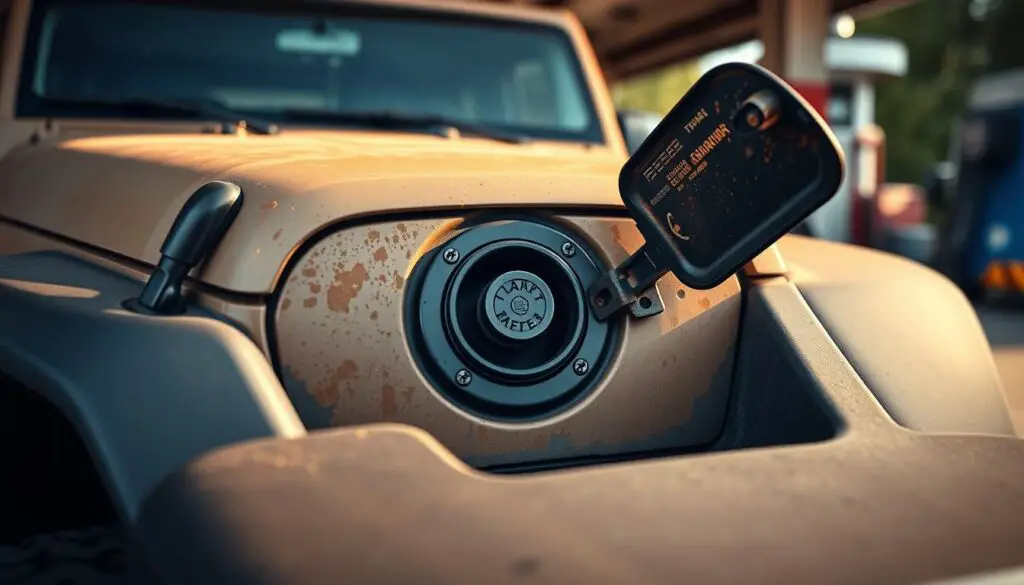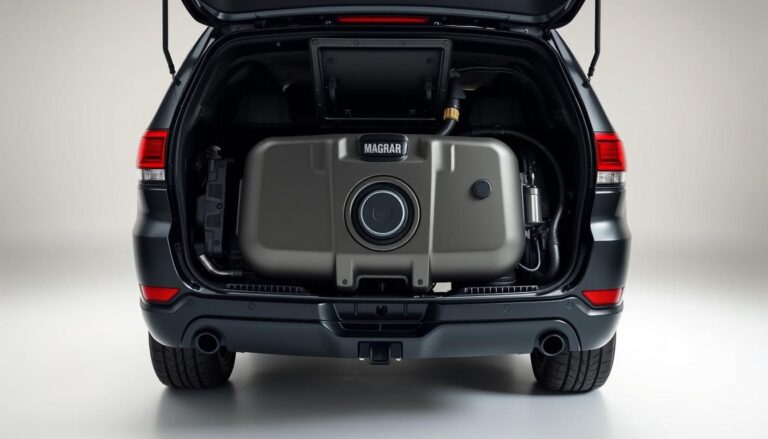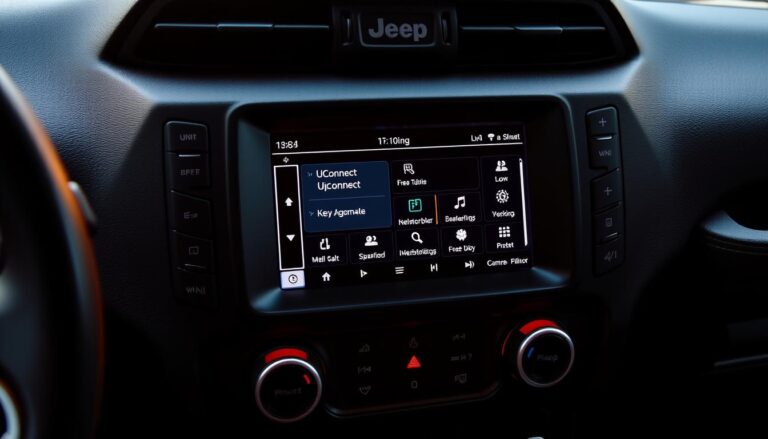The Jeep Wrangler is a popular vehicle known for its ruggedness and performance. To maintain its efficiency and longevity, it’s crucial to use the recommended fuel type. Using the correct fuel ensures optimal engine performance, better fuel efficiency, and reduces the risk of engine damage.
The recommended fuel for Jeep Wrangler varies depending on the model year and engine type. Generally, most Jeep Wrangler models require regular unleaded gasoline. However, some high-performance models may need premium gasoline for optimal performance.
Key Takeaways
- The correct fuel type is essential for maintaining the Jeep Wrangler’s performance and longevity.
- Most Jeep Wrangler models use regular unleaded gasoline.
- High-performance models may require premium gasoline.
- Using the wrong fuel type can lead to decreased performance and potential engine damage.
- Always check the owner’s manual for the recommended fuel type for your specific Jeep Wrangler model.
Jeep Wrangler Fuel Requirements Overview
Understanding the fuel requirements for your Jeep Wrangler is crucial for maintaining its performance and longevity. The type of fuel your Wrangler needs can significantly impact its engine efficiency, power output, and overall durability. As such, it’s vital to adhere to the manufacturer’s recommendations regarding fuel types to ensure your vehicle runs as intended.

Factory Recommended Fuel Types
The factory-recommended fuel type for your Jeep Wrangler is typically specified in the owner’s manual. Most Jeep Wrangler models require regular unleaded gasoline, but some high-performance or diesel variants may need premium fuel or diesel fuel. Using the correct fuel type is essential to maintain the vehicle’s performance and warranty.
“Using the wrong type of fuel can lead to decreased engine performance, reduced fuel efficiency, and potentially cause damage to the engine and fuel system,” as emphasized in the Jeep Wrangler owner’s manual. Therefore, it’s crucial to follow the manufacturer’s guidelines.
Different Wrangler Generations and Their Fuel Needs
Different generations of the Jeep Wrangler may have varying fuel requirements. For instance, older models like the YJ and TJ series typically used regular unleaded gasoline, while more recent models such as the JK and JL series may offer options for diesel or high-octane fuel. Understanding the specific fuel needs of your Wrangler’s generation is key to maintaining its health.
- The YJ and TJ series generally require regular unleaded gasoline.
- The JK series introduced the option for diesel engines, requiring diesel fuel.
- The JL series continues to offer diesel options and also features more advanced engine technologies.
What Kind of Gas Does a Jeep Wrangler Take
Understanding the correct fuel type for your Jeep Wrangler is crucial for optimal performance. The type of gas your Jeep Wrangler requires depends on several factors, including the engine type and model year.
Regular vs. Premium Fuel Requirements
Jeep Wrangler models come with different engine options, and the fuel requirement varies accordingly. Generally, the Jeep Wrangler can run on either regular or premium fuel, depending on the engine specifications.
For most Jeep Wrangler models equipped with the 3.6L Pentastar V6 engine, regular unleaded gasoline with an octane rating of 87 is sufficient. However, using premium fuel with a higher octane rating can provide better performance under certain driving conditions.
Octane Rating Recommendations by Engine Type
3.6L Pentastar V6 Requirements
The 3.6L Pentastar V6 engine, commonly found in Jeep Wrangler models, recommends using regular unleaded gasoline with an octane rating of 87 or higher. According to the official Jeep documentation, “using premium fuel in this engine will not provide any significant benefits under normal driving conditions.”
“Using the correct octane rating is essential for maintaining the performance and longevity of your vehicle’s engine.” –
2.0L Turbocharged 4-Cylinder Requirements
The 2.0L Turbocharged 4-Cylinder engine, available in some Jeep Wrangler models, requires premium unleaded gasoline with an octane rating of 91 or higher for optimal performance. Using regular fuel in this engine may lead to reduced performance and potential engine knock.
| Engine Type | Recommended Fuel | Octane Rating |
|---|---|---|
| 3.6L Pentastar V6 | Regular Unleaded | 87 |
| 2.0L Turbocharged 4-Cylinder | Premium Unleaded | 91 |

In conclusion, it’s essential to refer to your Jeep Wrangler’s owner’s manual to determine the recommended fuel type for your specific model. Using the correct fuel can enhance your vehicle’s performance, efficiency, and overall lifespan.
Fuel Requirements for Different Jeep Wrangler Models
Understanding the fuel requirements for your Jeep Wrangler is crucial for optimal performance. The fuel type and quality can significantly impact the vehicle’s efficiency, power output, and longevity. Jeep Wrangler models vary across different generations, each with its specific fuel requirements.
JL Series (2018-Present) Fuel Specifications
The JL series, being one of the latest generations, offers a range of engine options, including a 2.0L turbocharged inline-four and a 3.6L V6. For these models, regular unleaded gasoline with an octane rating of 87 is recommended. However, for optimal performance, premium fuel with a higher octane rating can be used, although it’s not required.
JK Series (2007-2018) Fuel Specifications
The JK series, which includes models from 2007 to 2018, typically requires regular unleaded gasoline with an octane rating of 87. Some models with more powerful engines might benefit from premium fuel, but it’s not mandatory. For specific guidance, it’s always best to consult the owner’s manual or the fuel filler cap for the manufacturer’s recommendation.
TJ and YJ Series Fuel Specifications
Older models, such as the TJ and YJ series, generally require unleaded gasoline, with the TJ series often using 87 octane fuel. The YJ series, being older, might have different requirements, so it’s essential to check the owner’s manual or consult with a mechanic familiar with these models. For more information on using different types of fuel in your Jeep, you can visit this resource for additional insights.
In summary, while many Jeep Wrangler models can run on regular unleaded gasoline, understanding the specific fuel requirements for your model can help ensure you’re using the right fuel for optimal performance and longevity.
Diesel Options in the Jeep Wrangler Lineup
Diesel enthusiasts will appreciate the Jeep Wrangler’s 3.0L EcoDiesel V6 engine option. This engine provides a significant boost in torque and towing capacity, making it ideal for off-road enthusiasts who need extra power.
3.0L EcoDiesel V6 Specifications
The 3.0L EcoDiesel V6 engine is designed to deliver exceptional performance and efficiency. With its advanced technology, it offers a robust driving experience. Key specifications include:
- 3.0-liter displacement
- V6 configuration
- EcoDiesel technology for improved fuel efficiency
Diesel Fuel Requirements and Considerations
To ensure optimal performance, diesel-powered Jeep Wranglers require specific fuel types and considerations.
Ultra-Low Sulfur Diesel Requirements
The 3.0L EcoDiesel V6 engine necessitates the use of ultra-low sulfur diesel (ULSD) fuel. ULSD is crucial for reducing emissions and maintaining engine health.
Cold Weather Performance Considerations
In cold weather, diesel engines can face challenges. Using winterized diesel fuel can help mitigate issues such as fuel gelling, ensuring the vehicle performs well in various conditions.
Fuel Economy and Tank Capacity Across Wrangler Models
For Jeep Wrangler owners, knowing the fuel economy and tank size is essential for planning long trips and daily commutes. The fuel efficiency of a Jeep Wrangler can vary significantly based on the model year, engine type, and whether it’s a two-wheel or four-wheel drive.
MPG Ratings for Different Engines
The MPG (miles per gallon) ratings for Jeep Wrangler models differ based on the engine. For instance, the 3.6L V6 engine offers an estimated 17 MPG in the city and 25 MPG on the highway for the 2-door model, while the 4-door model achieves slightly less, at 17 MPG city and 23 MPG highway. The 2.0L Turbo I4 engine provides a slight boost, with up to 22 MPG city and 24 MPG highway for certain configurations.
| Engine Type | City MPG | Highway MPG |
|---|---|---|
| 3.6L V6 | 17 | 25 (2-door), 23 (4-door) |
| 2.0L Turbo I4 | 22 | 24 |
Tank Size and Driving Range Expectations
The standard fuel tank capacity for most Jeep Wrangler models is around 21.5 gallons. However, the driving range can vary based on the engine and driving conditions. On average, a Jeep Wrangler can travel between 350 to 500 miles on a full tank, depending on whether you’re driving in the city or on the highway.
Factors Affecting Wrangler Fuel Efficiency
Several factors can influence the fuel efficiency of a Jeep Wrangler, including driving habits, tire pressure, and whether additional features like air conditioning are used. As one expert notes,
“Maintaining proper tire pressure and removing unnecessary weight from the vehicle can significantly improve fuel efficiency.”
By understanding these factors and knowing the specifications of your Jeep Wrangler model, you can optimize your fuel economy and plan your trips more effectively.
Common Fuel-Related Issues and Solutions
Understanding common fuel-related problems is crucial for maintaining the performance and longevity of your Jeep Wrangler. Fuel-related issues can arise from various factors, including the type of fuel used and how well the fuel system is maintained.
Effects of Using Incorrect Fuel Type
Using the incorrect fuel type in your Jeep Wrangler can lead to significant problems. For instance, using regular fuel in a vehicle that requires premium fuel can result in engine knocking or pinging, which over time can cause damage to the engine. Conversely, using premium fuel in a Jeep Wrangler that only requires regular fuel will not provide any additional benefits and is a waste of money.
Key issues with using the wrong fuel type include:
- Engine knocking or pinging
- Reduced engine performance
- Potential long-term engine damage
Fuel System Maintenance Recommendations
Regular maintenance of the fuel system is essential to prevent fuel-related issues. This includes:
- Regularly checking and replacing the fuel filter
- Using a fuel injector cleaner periodically
- Ensuring the fuel tank is not left nearly empty for extended periods, as this can cause the fuel pump to work harder and potentially overheat
By following these maintenance recommendations, Jeep Wrangler owners can help prevent common fuel-related issues and ensure their vehicle runs smoothly.
Dealing with Modern Ethanol-Blended Fuels
Modern fuels often contain ethanol, which can be problematic for some vehicles, including certain Jeep Wrangler models. Ethanol can attract moisture, potentially leading to corrosion within the fuel system. To mitigate this, it’s recommended to use fuel stabilizers or to run the vehicle until the fuel tank is nearly empty before storing it for an extended period.
“Using the right type of fuel and maintaining the fuel system properly are crucial steps in ensuring the longevity and performance of your Jeep Wrangler.”
Recent Updates to Jeep Wrangler Fuel Systems
Jeep has been innovating its Wrangler fuel systems, introducing new technologies to improve performance and reduce environmental impact. One of the most significant updates is the introduction of the 4xe plug-in hybrid technology.
4xe Plug-in Hybrid Technology and Fuel Requirements
The 4xe plug-in hybrid model combines a conventional engine with an electric motor, offering improved fuel efficiency and reduced emissions. According to
“Jeep’s 4xe technology is a game-changer, providing a balance between power and efficiency.”
The fuel requirements for this model are unique, as it can run on electric power alone for short distances, reducing the need for gasoline.
Upcoming Fuel System Innovations for Wrangler
Jeep is continuously working on improving the Wrangler’s fuel systems. Future innovations may include more efficient engine options and further electrification. As Jim Morrison, Jeep’s Chief Engineer, notes, “We’re committed to delivering performance while minimizing our environmental footprint.”
Environmental Regulations Impact on Fuel Choices
Environmental regulations are playing a crucial role in shaping the fuel choices for the Jeep Wrangler. Stricter emissions standards are driving the adoption of more efficient technologies, such as the 4xe plug-in hybrid. As regulations continue to evolve, we can expect further innovations in fuel systems.
Summary of Jeep Wrangler Fuel Requirements
Understanding the fuel requirements for your Jeep Wrangler is crucial for maintaining its performance and longevity. The correct fuel type varies across different models and generations.
For most Jeep Wrangler models, regular gasoline is sufficient, but some engines, like the 3.0L EcoDiesel V6, require diesel fuel. The JL series (2018-present) and JK series (2007-2018) have specific fuel recommendations that owners should follow.
Using the correct fuel type is essential to avoid potential engine damage and maintain fuel efficiency. Jeep Wrangler owners should consult their owner’s manual or contact a dealership for specific guidance on fuel requirements.
In conclusion, being informed about the fuel needs of your Jeep Wrangler ensures you can enjoy your vehicle to its full potential while maintaining its durability.
FAQ
What type of fuel does a Jeep Wrangler require?
The type of fuel required for a Jeep Wrangler depends on the engine type. Most Jeep Wrangler models use gasoline, while some models, such as those with the 3.0L EcoDiesel V6 engine, use diesel fuel.
Can I use regular gasoline in my Jeep Wrangler?
For most Jeep Wrangler models with a 3.6L Pentastar V6 engine, regular gasoline with an octane rating of 87 is acceptable. However, for models with a 2.0L Turbocharged 4-Cylinder engine, premium gasoline with a higher octane rating is recommended.
What is the recommended octane rating for my Jeep Wrangler?
The recommended octane rating varies by engine type. For the 3.6L Pentastar V6 engine, an octane rating of 87 is recommended, while the 2.0L Turbocharged 4-Cylinder engine requires a higher octane rating, typically 91 or higher.
Can I use diesel fuel in my gasoline-powered Jeep Wrangler?
No, using diesel fuel in a gasoline-powered Jeep Wrangler can cause serious damage to the engine and fuel system. It’s essential to use the correct type of fuel for your vehicle.
What are the fuel requirements for the Jeep Wrangler 4xe plug-in hybrid?
The Jeep Wrangler 4xe plug-in hybrid has specific fuel requirements. While it can run on gasoline, it’s designed to be charged electrically, and its fuel efficiency is optimized when used in conjunction with electric power.
How does the fuel type affect the performance of my Jeep Wrangler?
Using the correct fuel type is crucial for optimal performance. Using the wrong fuel type can lead to decreased performance, reduced fuel efficiency, and potentially damage your engine.
Are there any specific considerations for fueling my Jeep Wrangler in cold weather?
Yes, for diesel-powered Jeep Wrangler models, it’s essential to use winterized diesel fuel or add a diesel fuel anti-gel additive to prevent fuel line freeze-up in cold temperatures.
Can I use ethanol-blended gasoline in my Jeep Wrangler?
Most modern Jeep Wrangler models can use ethanol-blended gasoline, such as E10. However, it’s recommended to check your owner’s manual for specific guidance on using ethanol-blended fuels.


